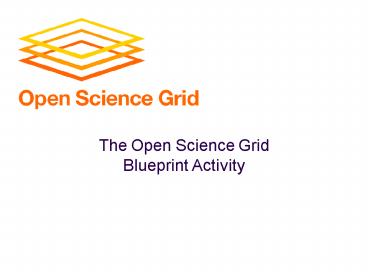The Open Science Grid PowerPoint PPT Presentation
1 / 17
Title: The Open Science Grid
1
- The Open Science Grid
- Blueprint Activity
2
Open Science Grid
- Open Science Grid is a Consortium
- It is not a project.
- Activities are where the work is done and rely
on contributions from external projects and
commitments of the participants. - The Participants share common goals and the
vision and make things happen through their
contributions. - like an Experiment Collaboration
- Of course - to get anything done need funding of
the effort and the infrastructure. Currently
funding is distributed through many paths in
order for contributions to happen.
3
Open Science Grid
- Common Grid Infrastructure - an evolution of
Grid3 adding resources, partners, services,
performance - Inclusive participation of Sites/Facilities,
Users/Organizations and Technology/Service
Providers to provide benefit to (large scale)
Science in the US. - http//opensciencegrid.org/documents/index.html
( Chep paper) - Facilities/Grids e.g. Fermilab, BNL, SLAC, LBNL,
JLAB, GRASE, partner with TeraGrid - Experiments e.g. ATLAS, CMS, CDF, D0, BaBar,
STAR, PHENIX, LIGO, SDSS, BTeV - Grid projects CS Middleware providers
Trillium, NMI, Condor, Globus, VDT, Virginia Tech - Governance Oversight from leading participants
and funding sponsors
4
Grid3 -gt OSG, Spring 05
5
Open Science Grid Blueprint
- Guiding Principles and Roadmap
- Basis for Planning a coherent technical program
of work - Not the plan itself Nor a capture of decisions
on technologies or implementation. - At any point in time the Blueprint is a
snapshot
6
What and Why a Blueprint.
- Questions to ask and measure Designs,
Architectures and Implementations - Framework to support Evolution and Advances in
Technology and Methods - Method to Explore our Vision independent of
Implementation
7
OSG in Partnership
- a NON-Goal to have an ARDA like Architecture or
Design Document. - a Goal to understand ARDA Architecture and Design
and comment against the Blueprint Principles - We would like if possible to discuss 2 of these
today - Namespaces and VOs
8
Blueprint is not the only document to be written
of course
- There is a Plan for Deployment of OSG and
Evolution of Grid3. - There will be an Operational Model
- There will are Performance Metrics and Goals
- There will be a Services and Technologies
Document - the Blueprint Activity is only one of many areas
in which OSG is and will work with EGEE/LCG - the Foundation is via the Blueprint Activity
- the Technical Engineering will evolve from the
Blueprint via the Satellite Activities and
Projects including Deployment, Integration,
Operations
9
Driving Principles for OSG Infrastructure
- Simple and flexible
- Built from the bottom up
- Coherent but heterogeneous
- Performant and persistent
- Maximize eventual commonality
- Principles apply end-to-end.
10
Example of Principle 1(Simple and Flexible)
- The OSG architecture will follow the
- principles of symmetry and recursion
- wherever possible
- This principle guides us in our approaches to
- - Support for hierachies of and property
inheritance of VOs. - - Federations and interoperability of grids
(grids of grids). - - Treatment of policies and resources.
11
Example of Principle 2(Coherent but
Heterogeneous)
- The OSG architecture is VO based.
- Most services are instantiated within the
- context of a VO.
- This principle guides us in our approaches to
- - Scope of namespaces action of services.
- - Definition of and services in support of an
OSG-wide VO. - - No concept of global scope.
- - Support for new and dynamic VOs should be
light-weight.
12
Example of Principle 3(Built from the Bottom
Up)
- All services should function and operate in the
local environment when - disconnected from the OSG environment.
- This principle guides us in our approaches to
- - The Architecture of Services. E.G. Services
are required to manage their own state, ensure
their internal state is consistent and report
their state accurately. - - Development and execution of applications
in a local context, without an active connection
to the distributed services.
13
Examples of Principles 4
- OSG will provide baseline services and a
reference implementation. - The infrastructure will support support
incremental upgrades - The OSG infrastructure should have minimal impact
on a Site. Services that must run with superuser
privileges will be minimized - Users are not required to interact directly with
resource providers.
14
(No Transcript)
15
youll recognise the architecture
16
Present Vo credential
GRAM
AuthZ
gridmapfile
VO CE installer
Resource Gatekeeper
SAZ
Resource Owner
GUMS
User submission
VO Broker
VO
VO CE
User proxy policy job encryption
User job ltuser credgt
User job ltuser credgt
User job ltuser credgt
AuthZ
Pull user
Job dispatch Service
submit VO starter
Present Vo credential
What additional interfaces are exposed to the
public internet (both directly and externally
controlled s/w)? -gt VO CE -gt VO starter via VO
CE All stakeholders need a control point to
impose policy -gt user submission -gt site Gk on
head-node WN -gt VO submission Gk on
head-node VO CE starter
Present user credential
Site batch
WN
Launch VO starter
WN
VO starter
put/get file
Present user credential
User app
SE
VO user
Site
17
Following up?
- Is it useful to make this Joint Session the first
in a series? - Our next Blueprint meeting is 15-17th Dec at UCSD.

